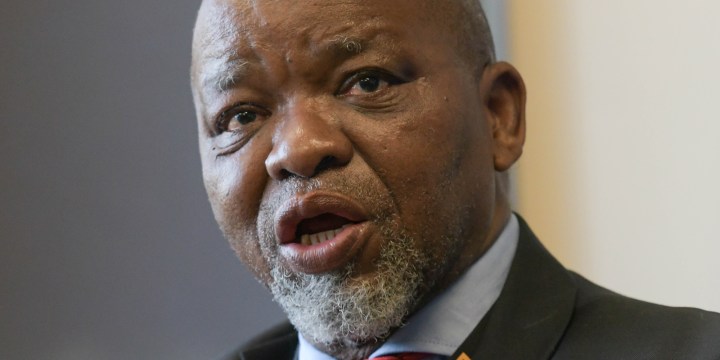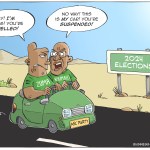AFTER THE BELL
Why Mantashe’s decision to snub the Joburg Mining Indaba is significant

Gwede Mantashe - who is the minister of both mineral resources and energy - had the choice of attending the oil conference in Cape Town and/or the Joburg Mining Indaba. He chose to attend the oil conference, where he and a bunch of Africa oil ministers had an enormous love-in.
Why has post-independence African economic development been so poor? This is not a small question. Small mountains of academic papers, books, surveys, World Bank analyses, country reports and development agency pontificating have been devoted to this topic.
In the face of all this academic knowledge, allow me to test a single sentence answer: African elites messed up. And what evidence do I have of that? One person: Gwede Mantashe.
But before we get to that, let’s put some facts on the table. It’s not as though post-independence African development has not happened, it’s just been weak, spotty and below the global average. In 1980 (as far back as IMF figures go), African GDP was around half a trillion dollars in constant modern figures. It is about $3-trillion today, according to the IMF. That seems like a decent increase.
The problem is that the world has gone from $11-trillion to around $100-trillion over the same period. Africa’s sixfold rise compares with the tenfold rise of the world as a whole, meaning that Africa is less economically meaningful today than it was in 1980.
How do you explain that? (And it gets worse.) On a per capita basis, because African population growth is strong, the sixfold absolute rise in GDP has translated into only a threefold rise in average incomes. Latin America, also a previously colonised region, has also had its problems, but has grown by about four times, off a much higher base. Still, there are comparisons to be made here.
What the IMF calls “Developing Asia” started behind Africa and has now so comprehensively overtaken Africa, the groups are no longer even in vaguely the same space. And please, these numbers are not “distorted” by China. Asean growth has really not been far off Chinese growth over the period.
I have to say I’m very affected by two books that try to answer this thorny question. The first is Why Nations Fail, by Daron Acemoglu and James Robinson. The second is False Economy, by Alan Beattie. Both books are getting a bit long in the tooth now; they are each over 10 years old. But I think it is significant that over this period, no book has seriously challenged the views espoused.
Visit Daily Maverick’s home page for more news, analysis and investigations
I can’t summarise them here, but I think the main thing I take away from Beattie’s book is that economic progress is not a function of the likability or even the corruption of leadership, although corruption obviously plays a role. Compare, for example, Tanzania under Julius Nyerere and Indonesia under Suharto. Nyerere was honest, likeable and incorruptible. But the country declined nevertheless.
Suharto, who was thuggish and eminently corruptible, made better economic choices: he opened up the economy, balanced the budget, attracted investment, and reduced unemployment. Suharto was ultimately booted during the Asian economic crisis, but by then the economy was on the road and Indonesia is now a modest powerhouse.
Why Nations Fail is more complex. The authors pose a crucial distinction between inclusive and exclusive institutions. It’s a subtle idea: much of European history through the enlightenment can be tracked as the growth of inclusive, and the decline of exclusive, institutions. You can track that tendency through, for example, the right to vote, moving from qualified to generalised systems of voting. The whole nature of inclusive systems is circulating and self-perpetuating.
The same, sadly, is true of extractive institutions, which arise when leaders resist development and focus instead on consolidating power. The result is repetitive cycles of poverty. It’s a fabulously complex but very convincing idea. You can see evidence of it all over post-independence Africa, in both directions. The extractive nature of pre-independence Africa was simply subsumed by new African elites, who concerned themselves, first and foremost, with power consolidation. The rest is history.
So how does this all relate to modern day South Africa, Gwede Mantashe, and this past week? The industry most compatible with extractive institutions is, I’m sorry to say, the oil industry. Because it’s a vital resource, oil allows small minorities to dictate to large majorities, both nationally and internationally. It’s rich and exclusive and largely state owned.
The same is partly true of the mining industry, but less so, partly because the mining industry is primarily in private hands. It’s also an “extractive” industry, but this is not what Acemoglu and Robinson were talking about; they were talking about institutional extractiveness, not the nature of the industrial process.
This week, Mantashe – who is the minister of both mineral resources and energy – had the choice of attending the oil conference in Cape Town and/or the Joburg Mining Indaba.
He chose to attend the oil conference, where he and a whole bunch of Africa oil ministers had an enormous love-in, and he decided not to attend the mining indaba. And really, that is all you have to know. You don’t have to listen to a word he said; his choice signalled it all.
If you are interested in what he actually said, he came out in support of coal, claiming (falsely) that “10 towns would be ‘ghost towns’ without the coal industry”, castigated the West for trying to “dictate” action to mitigate the climate emergency, and so on. You know, the usual. We have heard it all before.
Weirdly, I kinda like Mantashe personally – I know lots of my colleagues do too. But as Alan Beattie says, it’s not about personality, it’s about the choices you make. Mantashe is making the wrong ones – but then again, he is not alone. However, let’s be clear about this, people will suffer as a consequence. BM/DM


















There is really no excuse to attend the Mining Indaba just to open it and then leave for the Conference in Cape Town. Mining Companies have a lot of places to go to with their money. The notion that somebody owes South Africa investments comes from some entitlement that is misplaced. As long as we have Ministers like Mantashe who are arrogant and have self – importance we are not gong to see the investments required by the country. In DTI, we have a very silly Minister that is at war with industry and then you expect investments. Investors are not charity people they are looking for a return for investments. Once you try to tell them what to do with their money you are telling them not to invest in the country. Cyril appoints these clowns into Cabinet and then realises that they are the problem but instead of showing them the door, he creates parallel structures in the Presidency like investment envoys because Ebrahim Patel has no ability to attract investments, he appoint a person to deal with red tape because he realises that he has Ministers that he cannot fire who create red tape. The solution is to fire him as a President! These Ministers are a liability to the country if he crates parallel structures in the Presidency that ought to be dealt by Ministers and adds to the costs.
Agreed. Our ministers just do not have the intellect,integrity, will and required skills to fulfil their mandates. This is symptomatic of the ANC’s broadly and even more so the EFF.
After his announcement of a new mineral nobody had ever heard of at the Australian one he hopefully is too embarrassed. 🌵